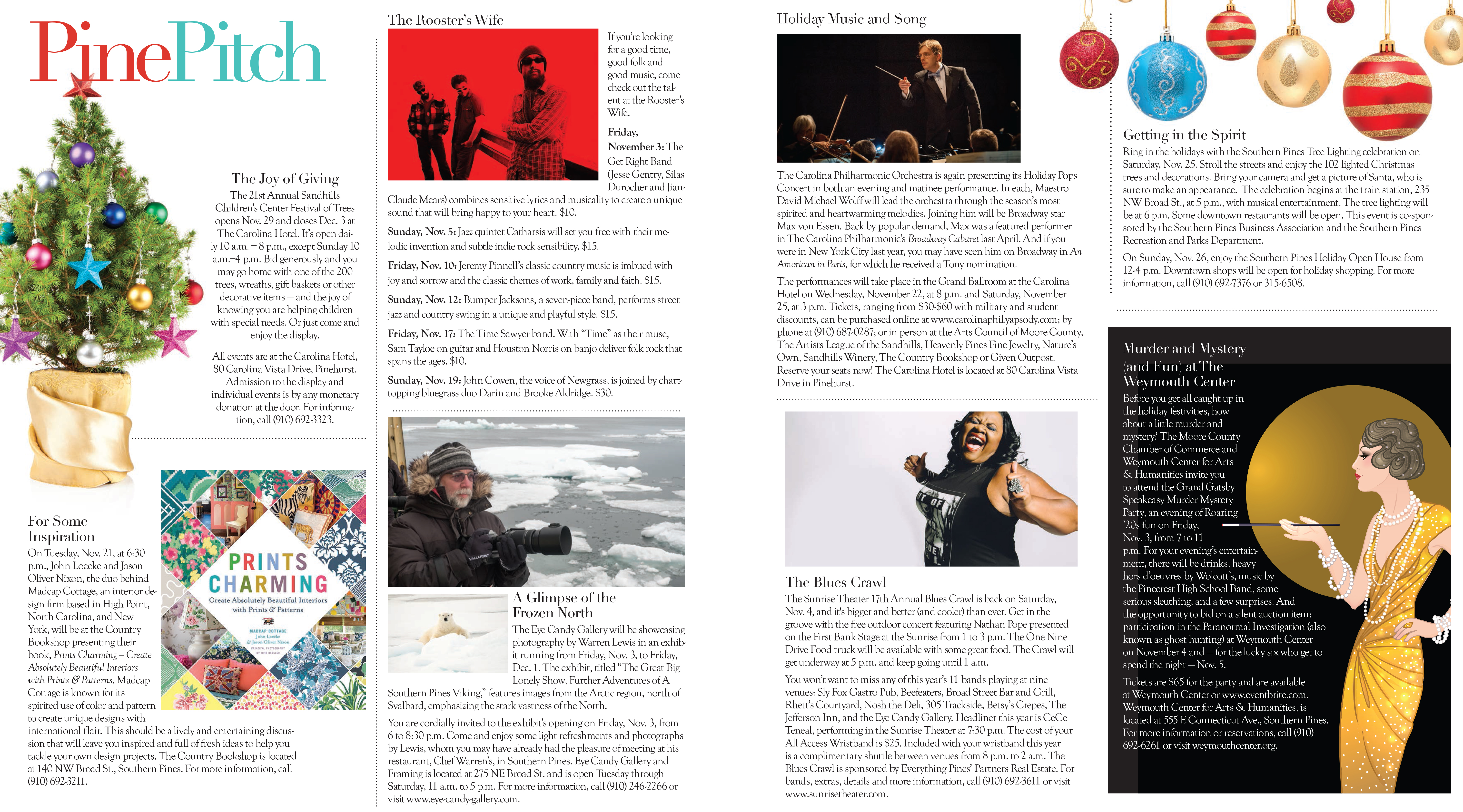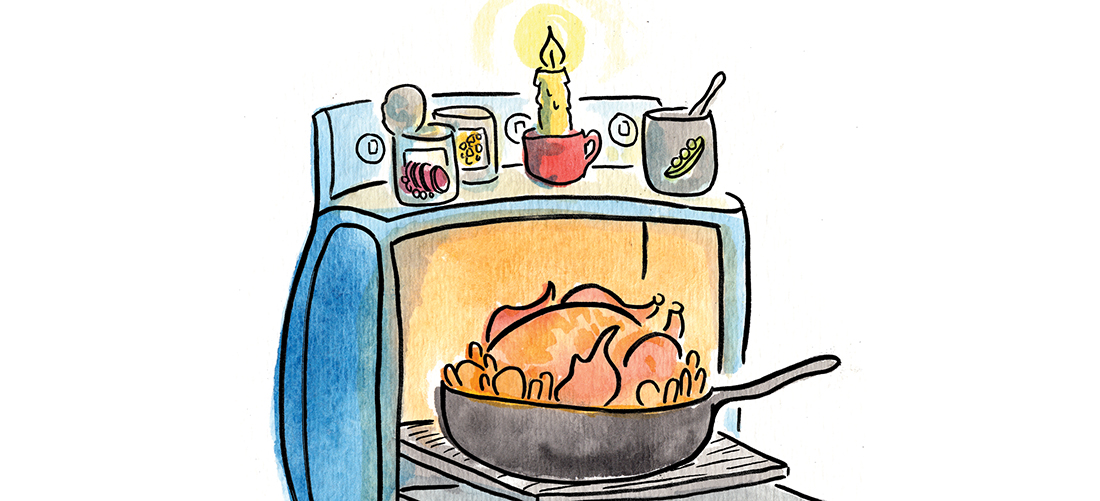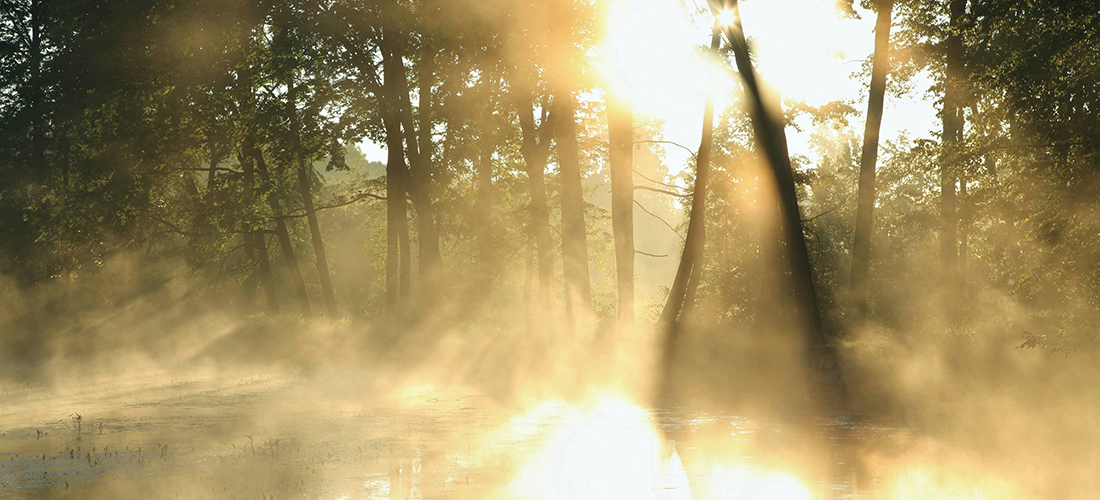
Five on a Blanket
And the memory of a simple Thanksgiving
By Joyce Reehling
Thanksgiving means a gathering of family, at least when I was a kid and even in college. Holidays are always a mixed blessing of food and potential mayhem. But in about 1974 I was living in New York, struggling to begin my theatrical career.
Amid a group of similar women, I lived in the now defunct Rehearsal Club, two brownstones which housed, in shared rooms, girls starting out. Carol Burnett had lived there, Blythe Danner and many others. And me, Kathie and Connie.
When someone really made it they got an apartment. This was likely to be a fourth floor walk-up with a roommate or boyfriend. The apartment would be very small with furniture that was often found on trash removal days around the city. It used to be that if you knew when the high-end neighborhoods were throwing things out, the chances were you could score really nice chairs, tables and other finds. Sometimes a coat of paint, a new seat cushion or no change at all landed you something you could not begin to afford.
And so it was that Connie had an apartment with her boyfriend. She invited her circle of girlfriends to come for Thanksgiving. This flat was up a lot of stairs, no view except the street and two rooms plus bath. I don’t recall much in the way of furniture. In the bedroom they had built the ubiquitous loft bed to provide a desk/dressing area below.
We all were to bring something. We had no way to cook at the Rehearsal Club. Two meals a day were provided, but we did not have access to the kitchen. We all had to save up a little extra so we could buy a baked pie or cans of food to warm up at the flat. Once we paid our room and board we were mostly broke. This took planning.
My absolutely fondest memories of that day are quite humble. The kitchen was a former closet into which the landlord had stuffed the world’s smallest sink, stove and refrigerator. I referred to it as the Easy Bake kitchen. It looked like a real kitchen but barely was.
Connie and her fella committed to having a large chicken — turkey was beyond our budget and well beyond the width of the Easy Bake oven. Someone brought peas or beans, someone a pie. We resembled the motley dinner in It’s A Wonderful Life more than we did the Pilgrims’ feast.
We borrowed cutlery from the Club and because there was no dining table, we had a picnic on a blanket on the floor, sitting around eating our humble meal. We felt like adults on their way, and Connie clearly had gone up a rung in our eyes.
We talked and laughed. I do not remember a cross word or anything approaching an argument. We were not the typical family, so we did not have the drama many families have at Thanksgiving. We were deeply and truly thankful. We were young and pursuing our chosen careers and we had one another.
The Easy Bake oven took a little longer than normal to bake that poor little chicken, but we did not care. We were in an apartment of a friend, on our way to what we would become.
Connie went on to TV shows, including Knots Landing, and later became a certified psychotherapist. Kathie got a Ph.D. and is a psychologist. I spent the better part of 35 years in the theater. A couple of years ago we had a reunion to celebrate 100 years of women starting out at the Rehearsal Club. It is greatly missed.
We have all had many Thanksgivings since, but none shines brighter in my heart than the five of us on a blanket, in a fourth floor walk-up with canned food and a solitary chicken.
“We were very tired, we were very merry,” wrote Edna St. Vincent Millay, and we gave all we had for that day. We gave thanks for our little path toward our future. Time and blessings can dull our sense of gratitude. Rushing from a table to buy something for Christmas weakens the day. Nothing reminds me to be truly grateful like the memory of those girls, of that picnic and the Easy Bake kitchen. We had so little but we had hope, and each other. We were very young and very merry. PS
Joyce Reehling is a frequent contributor and good friend of PineStraw.
The Most Revealing Month
Savoring the bittersweet fruits of November
By Jim Dodson
For a number of reasons, I call November the Most Revealing Month.
To start, the gardener in me likes to see my gardens nicely mulched and tucked in for a decent winter snooze. This is when I step back and take stock of my brilliant and bonehead gardening maneuvers conducted over the long hot summer, while awaiting the post-holiday avalanche of spring gardening catalogs, which a fellow gardener pal calls “porn for plant people.”
The outdoorsman in me loves the soulful sight of November’s bare hardwoods stripped clean of leaves, revealing nature in all her naked glory, “That time of year thou mayst in me behold,” as my fellow autumn-lover Will Shakespeare described in his 73rd sonnet, “When yellow leaves, or none, or few, do hang/ Upon those boughs which shake against the cold /Bare ruin’d choirs where late the sweet birds sang.”
During the two decades we lived in a house I built on a forested hill near the coast of Maine, surrounded by 600 acres of old-growth birch, maple and hemlock, November was prime time for topping up my woodpile and erecting my elaborate Rube Goldberg plant protectors that never failed to amuse the FedEx guy when he found his way up our lonely road into the forest. More than once he asked me why I went to all the trouble to build an elaborate garden deep in a wood that only family, friends, occasional lost strangers, the odd moose and the FedEx Guy himself would ever see.
“Summer’s lease is brief. And bittersweet November simply reveals how far I’ve progressed on this earth,” I continued, though I don’t think he cared a fig for either bare ruin’d choirs or boughs shaking against the cold.
Owing to the angle of the retreating sun, that said, the November sunlight always seemed deeper and richer on late autumn afternoons, a benediction through stained glass, throwing the contours of my wooded patch of earth into stunning relief, while the rocky soil underfoot offered spicy scents of decaying leaves and the garden’s last gasp as my private world turned inward. As a bonus in the department of sidereal affairs, the stars on any clear November night tended to glitter like diamonds splashed across black velvet — ideal for catching the Milky Way, the year’s final meteor showers and in some years the rare treat of the Northern Lights.
To my November-loving way of thinking, blazing fires, the earlier darkness and the annual gathering of the tribe for the slower, unrushed Thanksgiving rituals — cook, eat, watch football, doze in an armchair, take a walk in the woods, eat again, doze again, have a final slice of pumpkin pie before bed — made the holiday my top designated feasting day of the year. (Though I’m thankful it comes but once a year. Otherwise I’d resemble either Shakespeare’s Falstaff or at the very least Clifford the Big Red Dog balloon from the Macy’s Thanksgiving Day Parade.)
Not surprisingly, November is the keeper of many of my favorite memories.
Three decades ago, having uprooted my life and moved from Atlanta to a bend in the Green River outside of West Brattleboro, Vermont, I found myself unexpectedly renewed owing to the charms of the eleventh month.
Having taken possession of a small wooden “solar cabin” owned by a pair of delightful aging hippies who’d grown wealthy selling chemical toilets to fellow urban escapees, I heated the place with apple wood I split by hand, falling asleep most nights under a down quilt, warmed by the glow of my Intrepid woodstove and a young golden retriever from the local Humane Society who believed two-dog nights were better than one.
Before month’s end, I’d taken up fly fishing and playing golf again on a 9-hole course in town. An old-timer informed me Rudyard Kipling played there during the time he lived in Brattleboro, allegedly not long after he published The Jungle Book. I never managed to confirm this story but the very idea of it helped me rediscover my favorite boyhood game.
That November, my neighbors along the river road invited me to a community “alternative” Thanksgiving supper at a local hay barn. There was a fiddle band and lots of covered dishes made from local organic gardens, “all natural” dishes that to my traditional Southern palate tasted suspiciously like sautéed boxwood, including something that looked just like turkey but turned out to be my first encounter with tofu.
To a slightly homesick Southern boy far from home, missing his mama’s famous collard greens, cornbread and fried okra, this constituted a walk on the wild side of American counter-culture that I cherish to this day. That evening, I danced with a beautiful gal named Snowflake who ran a mushroom farm and had more underarm hair than me and innocently inquired if — my being from “The deep South” — I’d ever met anyone who was “actually in the Ku Klux Klan.” I replied with a tongue firmly planted in cheek that my daddy his own self was once in “our local Klan – until his klaxon switched from wearing all-natural cotton sheets to perma-press.” For some reason, she did not find this amusing. The dance ended quickly and I never did get to try one of her gourmet mushrooms.
The next time November rolled round, however, I went on a first date with a beautiful dark-haired girl who’d just graduated from Harvard and had come to work at the magazine where I was not only the senior writer but also the first Southerner in Yankee Magazine’s 75-year history. By then I was living in the middle of a New Hampshire apple orchard just outside Peterborough and having the time of my life writing about life in every cozy corner of rural New England — working at a legendary magazine where I learned most of what I know about the power of great storytelling.
That next autumn, that beautiful girl and I got married in a salt marsh north of Boston, days after a hurricane swept up the coast from Carolina. Our colorful Yankee neighbors in the village of Essex brought covered dishes — baked beans, turnip pie, Indian pudding and homemade wine. The dancing went on until well after midnight, about the time the dance floor began to sink in the mud.
I’d come far and my romance with November continued — and grew — over the next two decades. It was the month I most loved for working in my large faux English garden at summer’s end in Maine, topping up my woodpile for the winter, cleaning my tools, tucking in plants, drinking hot cider, watching fires and changeable skies and the southward flight of birds, savoring the solitude and beauty of nature’s most revealing month.
Between us, I thought I would never part with that house I designed and built on that beautiful forested hill of birch and hemlock; I had always imagined my ashes someday being spread over a garden I spent almost a third of my life building and tearing apart, fussing over and planning, digging into the soil and delving into its soul.
But as Truman Capote once pointed out, every Southern boy comes home again — if only in a box.
In time, after my children had grown and headed off on their own life journeys, I succumbed to a quiet longing for home that had to be answered.
It was a decision I’ve never fully regretted, for memories are like glowing coals in winter and life is full of lovely compensations. One is this magazine and the circle I’ve somehow closed.
Another is November in North Carolina where I can grow roses almost to December, a month just as sweet and revealing as it ever was on my soulful Maine hilltop . . . though I do miss the naked forest, that lonely moose and the mystified FedEx Guy from time to time. PS
Contact Editor Jim Dodson at jim@thepilot.com.
Early to the Woods
First light in a Southern swamp
By Tom Bryant
I was just getting ready for, hopefully, a good night’s sleep. Granted, the evening was still young, but I was planning an early rendezvous with a brace of wood ducks right before sunrise. “I’m going to bed,” I said to Linda.
“It’s just 9 o’clock. What time are you getting up?”
“Four-thirty should give me enough time to get to the swamp right before shooting time. The truck’s loaded with all the gear, coffee pot’s ready to fire up first thing, sausage biscuits are wrapped and in the fridge. Not much else I can think of except creeping out of here without waking my cute little bride.”
Linda looked up from her latest issue of Southern Living. “You know I can’t sleep with you rattling around in the kitchen. I’ll get up and help you pack your lunch and send you on your way. And you be real careful in that swamp tomorrow. I hate for you to go off hunting before daylight all by yourself. What if you broke a leg or something? You aren’t a youngster anymore.”
“Babe, just how many years have I been doing this without breaking anything? I might not be as young as I was, but I’m a lot wiser. Remember what Gus McCray said in Lonesome Dove: ‘The older the violin, the sweeter the music.’”
“That quote has nothing at all to do with you wandering around a snake-infested swamp before sunrise. You know that,” she admonished. I headed down to the guest bedroom so I wouldn’t wake her during the night. In my excitement before a morning duck hunt, I usually toss and turn a lot.
With my hunting clothes laid out, I climbed in bed and read a little of Havilah Babcock’s classic book, My Health Is Better In November. I thought about the similarities of our lives, hunting and fishing in the South. He grew up in Virginia but lived and had most of his outdoor experiences in the low country of South Carolina. He was head of the English department at the University of South Carolina and was so popular that students had to sign up for his class a year ahead of time. There was one great difference in our experiences in the woods, though. He bird-hunted when quail, or partridges as the true old-time Southern hunter called them, were extremely plentiful. It was nothing in his day to jump 10 or 15 coveys. I, on the other hand, might raise one covey, or as of late, no birds at all.
I put Havilah’s book on the nightstand and clicked off the light, making a mental list about the gear needed for the next day’s hunt. Canoe loaded on top of the truck, paddles in the back, wood duck decoys in the decoy bag ready to go, shotgun and gunning bag beside the back door, hunting coat and waders ready to put in the back seat. I would put them on before I pushed off in the canoe.
The next day’s weather was going to be a bluebird day, a little crisp, but not too cold. I’ve found that wood ducks really aren’t that influenced by the weather, though. Usually, with them, it’s a morning event, over right after sunrise. A big yawn and stretch placed me in Lady Morpheus’ arms, and the next thing I knew, the little alarm clock beside the bed was ringing me awake.As promised, Linda met me in the kitchen and had already fired up the coffee maker. In short order, the thermos was loaded with fresh hot coffee, my travel mug was ready to ride, the biscuits were in my gunning bag, and I was eager to head to the swamp.
“You be careful,” Linda admonished again, and I quietly eased out the back door, cranked the old Bronco and was on my way. I’ve noticed lately that 5 o’clock in the morning is not as deserted as it used to be in Southern Pines. These days, there are a lot more troops on their way to work at Fort Bragg. As I got farther out in the county, though, traffic became sparser, and I soon rolled up to the locked gate at the entrance of the farm I lease for hunting. There was still plenty of time before daybreak to drive to the tree line where I could drag the canoe to the beaver pond nestled in a low cut in the swamp.
My canoe is a camouflaged Old Town boat perfect for hunting and fishing out-of-the-way locations. And best of all, it’s lightweight enough to let me hoist her on top of the Bronco without pulling a muscle or tearing a rotator cuff. A nearly full moon reflected enough light to help me navigate through thick alders and briars as I dragged the boat to my launching point. In almost no time, I had the canoe loaded, and I cast off into the darkness.
A swamp at night can be a forbidding place; but fortunately, I had spent enough time walking the perimeter of the banks of the beaver pond to get the lay of the land, and moonlight helped me paddle to the spot where I wanted to hunt and hunker down to wait for sunrise.
With the decoys set out, I draped an old brown tarp over the bow of the canoe and sat on the floor of the boat to present a smaller profile. I was right next to a giant cypress and used one of the paddles to wedge the boat in as close as I could. All in all, it was a pretty good set. Watching the world come alive on a late fall morning is one of the things that keeps me coming early to the woods as many times as I have. It’s a wondrous thing. All the cares of the day before are a thing of the past as the grayness of dawn begins to cast shadows and the sun begins to rise over the pines. I’ve seen hundreds of sunrises and you would think that they would all be alike, but it’s not that way. I believe that each one is like the day itself, always the same but forever different. It heralds a new opportunity, a new beginning. I checked my watch; another 10 minutes and it would be legal shooting time, and in the distance, down toward the creek, I could hear the hawk-like screech of a wood duck on the move. The sun was just peeking through the underbrush. It was going to be a great new day. PS
Tom Bryant, a Southern Pines resident, is a lifelong outdoorsman and PineStraw’s Sporting Life columnist.




